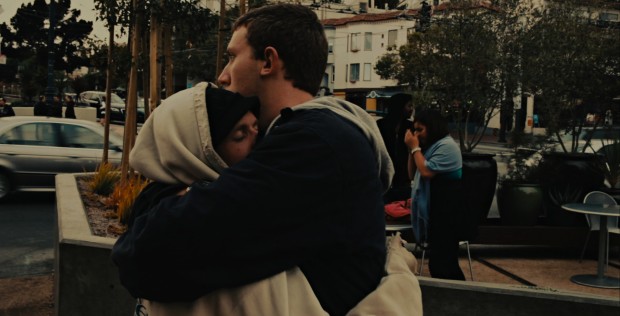 TYLER JOHNSON AND JAMES TEMPLE IN AMERICAN VAGABONDSan Francisco more hell than paradise for homeless young gays
TYLER JOHNSON AND JAMES TEMPLE IN AMERICAN VAGABONDSan Francisco more hell than paradise for homeless young gaysThis documentary about the plight of gay runaways focuses on James Temple, the narrator, who when not yet 18 or barely, runs away (not for the first time) from his home in Chico, California with his boyfriend Tyler Johnson. Inspired by naive, small-minded and thoroughly homophobic "Christian" attitudes, James's father has all along reacted to the realization that his son is gay with nothing but hostility. When he threatens to get the 18-year-old Tyler sent to jail because he's had sex with slightly under 18 James, that's the last straw. James and Tyler flee together to that gay mecca, San Francisco. But it's no mecca for them. It's expensive and jobs are scarce. The gay men in the Castro look down on the scruffy, penniless, hungry boys. They mostly sleep in Golden Gate Park where they hide from the police with other gay vagabonds, feeling like it's Germany and they are Jews, as James tells it. James, whose voice-over runs through this film, eventually decides San Francisco is a gray city, of gray people, gray skies, and "gray souls everywhere."
The screen is pretty dark a lot of the time during Finnish filmmaker Susanna Helke's coverage of James and Tyler, loving and inseparable at first, trying to sleep furtively in the park. They have spent one night in a nice hotel and had one good meal, James recounts, and then are broke. The film's crude but heartfelt editing with its moody, poetic pans of garbage, bushes, and dark grass and the insistent use of Somuli Kosminen's portentious, droning music could come right out of one of gay auteur Toby Ross's artiest 70's porn films -- except there's no sex, only hugging. (Interspersed home-movie style images of a young boy playing seem inappropriate for a documentary, but add to the Toby Ross feel.) As James' narration continues there are scenes of panhandling, a homeless center where they get haircuts and their laundry done, eating in cheap cafes, talking to other gay homeless youths. But Helke doesn't recreate a street youth society the way Martin Bell did, working with his wife Mary Ellen Mark, in their classic 1984 documentary of Seattle kids,
Streetwise. Sometimes James and Tyler are so hungry they can't sleep. The boys continue, existing uncertainly from day to day, wearing their day-packs, Tyler wheeling his suitcase everywhere. Tyler applies for some jobs promising he checks his email several times a day. Life gets harder. They begin to fight, but they can't break up, James says. They refuse gay men who come to the park promising showers, warmth and food in exchange for sex, but once they are so desperate they do have sex with a man who contacts them on the Internet -- for fifty dollars. They adopt a dog they call Money and it gives them hope to care for it, but it "gets a dog disease" and dies, and after that James and Tyler's relationship suffers further.
They give up and return to Chico. In phone conversations, James' mother has softened toward him, and she welcomes him back, but Tyler can't come there, so James chooses to be elsewhere. Suddenly, James' mom is talking to him in jail. Ironically, considering his father's earlier threat, he has had sex with a 16-year-old gay boy whose father and stepfather subsequently press charges. James has gone into protective custody awaiting trial as a sex offender. As the film ends, he is serving a three-year sentence in state prison. The only positive aspect is that James' mother cares about him a great deal now, and his sweet letters from jail have even changed his father, who now weeps for him. James says in a letter that he hopes he can go hunting with his father when he gets out -- something that, when he was a boy, he didn't like. But he will be forced to register as a sex offender for the rest of his life -- for sex with a willing partner two or three years younger than him.
On his blog First Impressions, José Arroyo concludes his
review of this film, which he watched in Vilnius, Lithuania in July 2013, by saying that "The film is crude, unsophisticated and lacks texture: but it sure does the job." That seems about right. These slices of unlucky life are raw and hard to digest. There is also the moral question of how you can film people in dire distress and not help them, but in their way, Helke and her crew have been faithful observers. An IMDb summary for this film claims that one out of four young people who come out to their parents are kicked out of the house and that "20 to 40 percent" of homeless youth in the US may be part of a sexual minority.
American Vagabond, 85 mins, debuted 27 Feb. 2013 at DocPoint Film Festival; has shown at half a dozen other international festivals. It was photographed by Marko Luukkonen, edited by Niels Pagh Andersen and produced by the Finnish Film Foundation. Screened for this review as part of the San Francisco Film Society's series, Cinema by the Bay, Nov. 22-24, 2013.





